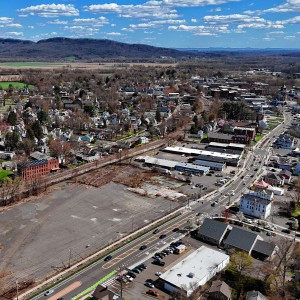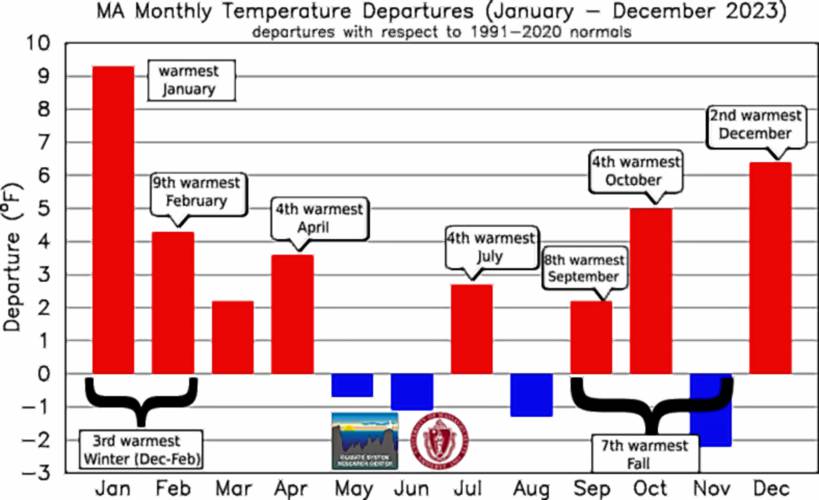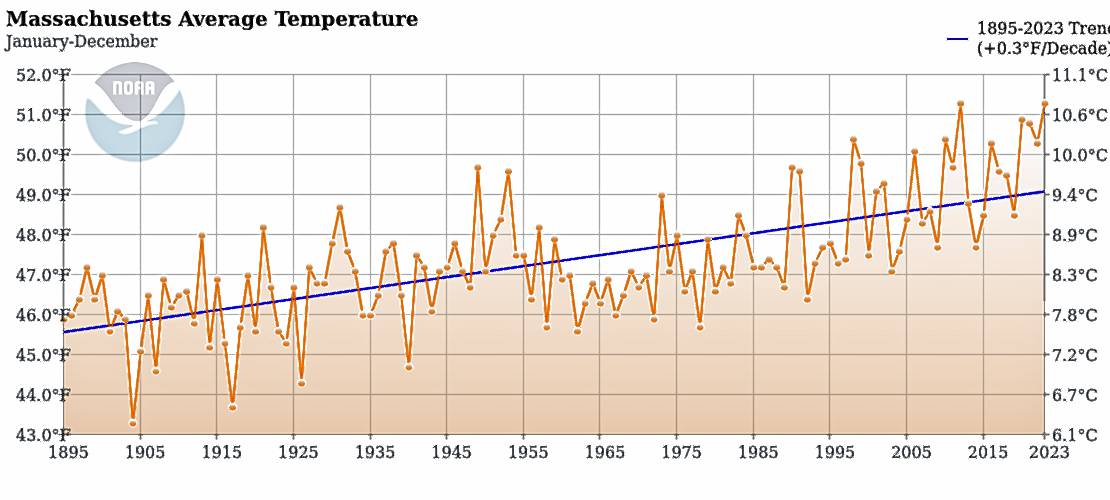Massachusetts sees record-setting temperatures, precipitation in 2023
| Published: 01-14-2024 7:00 PM |
A trend of warm years further cemented itself in 2023, as Massachusetts experienced, on average, its warmest year on record, according to new data from the University of Massachusetts Amherst.
The average temperature around Massachusetts for the year measured 51.3 degrees — 2.5 degrees above the normal temperatures for the region — marking the warmest year since records began in the late 19th century, according to UMass’ Climate System Research Center.
The high temperature goes beyond the borders of Massachusetts and into the rest of New England and the Northeast, with New Hampshire experiencing its warmest year on record and Connecticut, Maine and Vermont experiencing their second-warmest year. Overall, it was the fifth-warmest year on record for the contiguous U.S., according to the National Oceanic and Atmospheric Administration (NOAA).
“The trend, the pace of the warming, is concerning,” said Michael Rawlins, associate director of the Climate System Research Center. “We’re seeing more and more years that are well-above average and that tells us the pacing of warming may be accelerating.”
While summer temperatures other than July were below average, the fall and winter temperatures in Massachusetts were well above average, with the second-warmest winter on record and the warmest January ever measured, according to the Climate System Research Center.
The effects of a warming winter, Rawlins said, will touch many aspects of life, including recreation and agriculture.
“There’s always still going to be cold days, but their frequency is diminishing,” he said. “The absence of extreme cold in winter is profoundly impacting the environment, livelihoods and the disappearance of the frozen season.”
On top of the heat, the state also experienced its seventh-wettest year on record, with more than 57 inches of precipitation dropping on the region, which is nearly 9 inches above average.
Article continues after...
Yesterday's Most Read Articles
 More than 130 arrested at pro-Palestinian protest at UMass
More than 130 arrested at pro-Palestinian protest at UMass
 Public gets a look at progress on Northampton Resilience Hub
Public gets a look at progress on Northampton Resilience Hub
 Northampton bans auto dealerships near downtown; zone change won’t affect Volvo operation on King Street
Northampton bans auto dealerships near downtown; zone change won’t affect Volvo operation on King Street
 UMass basketball: Bryant forward Daniel Rivera to be Minutemen’s first transfer of the offseason
UMass basketball: Bryant forward Daniel Rivera to be Minutemen’s first transfer of the offseason
 Town manager’s plan shorts Amherst Regional Schools’ budget
Town manager’s plan shorts Amherst Regional Schools’ budget
 Police respond to alcohol-fueled incidents in Amherst
Police respond to alcohol-fueled incidents in Amherst
The precipitation data, Rawlins added, was paced by extreme weather events, where storms would dump inches of rain at a time on the region.
Franklin County was no exception to the trend of harsh weather in 2023, as evidenced by the three extreme rain events that dumped buckets of rain on the region on July 10, 16 and 21. While the majority of the region was spared serious damage, the towns of Deerfield and Conway are still reeling from millions of dollars worth of flooding damage.
Conway’s July, in fact, was record-breaking, as the National Weather Service’s Boston office posted on social media that the town received anywhere from 19.34 to 21.42 inches of rain in the month of July, the highest rainfall total in all 50 U.S. states, Canada and Puerto Rico.
In general, Rawlins said that wet climates, such as the Northeast, are expected to get wetter, while dry climates are projected to get drier. The climate center’s data also found that in 2023, Amherst experienced 23 days with more than 1 inch of precipitation, which was the most over the 131-year observational record.
“A warmer atmosphere is producing more frequent extreme precipitation events,” Rawlins said, noting the Amherst data as possible “evidence that the water cycle is intensifying as a result of warming.”
These types of weather events are becoming more common around the nation as well, according to the Fifth National Climate Assessment, which is published regularly by the U.S. Global Change Research Program in partnership with numerous federal government agencies.
“Harmful impacts from more frequent and severe extremes are increasing across the country,” the report states. “Including increases in heat-related illnesses and death, costlier storm damages, longer droughts that reduce agricultural productivity and strain water systems, and larger, more severe wildfires that threaten homes and degrade air quality.”
In analyzing the data, Rawlins said there is a growing concern about mitigating the future effects of climate change.
“The extreme heating in 2023 should serve as a warning,” he said. “Rapid reductions in the use of fossil fuels is urgently needed to avoid the most worrisome impacts of climate change.”
Chris Larabee can be reached at clarabee@recorder.com.



 State Senate budget funds free community college for all
State Senate budget funds free community college for all ‘We can just be who we are’: Thousands show support for LGBTQ community at Hampshire Pride
‘We can just be who we are’: Thousands show support for LGBTQ community at Hampshire Pride Doors open at Tilton Library’s temporary home at South Deerfield Congregational Church
Doors open at Tilton Library’s temporary home at South Deerfield Congregational Church Area property deed transfers, May 2
Area property deed transfers, May 2
